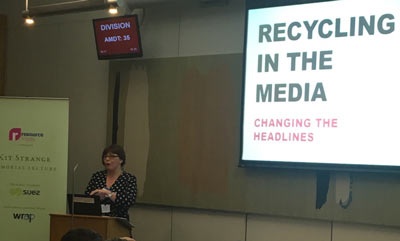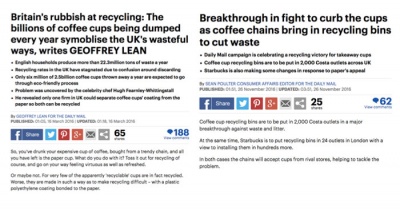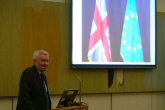Cannard calls for better storytelling to change waste behaviours
Engaging personal stories have the greatest power to inspire and encourage positive behaviour change, waste blogger Karen Cannard told an assembled audience of resource industry professionals at the Kit Strange Memorial Lecture, held yesterday (28 February) at the Houses of Parliament.
 Delivering the annual speech, this year entitled ‘Recycling in the Media: Changing the Headlines’, in memory of Kit Strange, a pioneer in the idea of waste as a resource, Cannard told attendees from across the waste and recycling industry that it is stories of real people are those that resonate most clearly with the public.
Delivering the annual speech, this year entitled ‘Recycling in the Media: Changing the Headlines’, in memory of Kit Strange, a pioneer in the idea of waste as a resource, Cannard told attendees from across the waste and recycling industry that it is stories of real people are those that resonate most clearly with the public.
Beginning with a trip down memory lane from her past nine years in the industry since she began her blog The Rubbish Diet after taking up a zero waste challenge, eventually becoming an advisor to a number of television and radio programmes on waste, Cannard noted how she first realised that recycling “brings out people’s passions” when she read the forum of a Woman’s Hour article about her recycling journey. There, she noticed strong and varied opinions, including some saying that she was “going over the top” (she had limited her residual waste to a single plaster) and others saying that her commitment was inspiring and would make her a good candidate to be Prime Minister.
This passion, she said, means that local media in particular has “the power to engage and inspire”, with stories written not by faceless local authorities but by local personalities, allowing the perception of normal local people to connect with other regular people.
She gave the example of her local radio station in Suffolk getting on board with the Rubbish Diet Challenge – Cannard’s three-week programme for slimming your bin – getting hundreds of local people involved and having fun with the idea, which led to journalists from the local paper also getting on board. In this way, she said, programmes such as hers “can become a training ground for people who can spread the message”.
On a national level, Cannard recalled her work on various television programmes including Hugh’s War on Waste (2015), Throwaway Britain (2013), and recently ITV’s Battle of the Bins (2016), which she said started off looking at community schemes on a positive note before a new director changed the approach to “bin bashing” in the Greater Manchester district of Bury, where some residents were struggling to adjust to the new three-weekly residual waste collection, showing how the slant of a programme is dictated by its creators.
On the other hand, celebrity chef and campaigner Hugh Fearnley-Whittingstall, who won last year’s Resource Hot 100, made it “impossible to ignore” the positive changes that can be made when people are given more information. Cannard noted that the programme’s producers, KEO Films, “got involved with industry right from the start and allowed industry to show them the potential story arc”.
Among the stories covered in Fearnley-Whittingstall’s programme were that of reluctant recyclers in Prestwick, coincidentally in Bury, and it is these examples, say Cannard, that make the biggest impact on those watching, and have the added benefit of being entertaining.
One particular example of unhelpful negative portrayals of recycling highlighted in the lecture was the “almost daily wailing” of the Daily Mail, with Cannard noting: “If I were its mother I would put it on the naughty step”.
The generalisation and simplification involved in many stories published by the paper is harmful to the cause, she said. Specifically, she chastised the paper for its use of emotive language, recalling phrases like “bin barons”, “town hall bureaucrats” and, most pertinently, “draconian rules”. “Is this what people really think,” asked Cannard, “or is this the Daily Mail dictating what we think?”
But, according to Cannard, even the Mail has, of late, seemed to turn a corner, backing campaigns like the drive for plastic bottle deposits, and sometimes speaking in more positive terms to its 29.4 million monthly readers. Even last December, when the paper decried the supposed ‘shambles’ surrounding the recycling of Christmas cards, it accompanied the story with a section answering common questions on how to recycle troublesome materials, suggesting a more positive outlook.
 Cannard also compared two stories (right), one from 2016 and one from 2013, about having a recycling container in the bathroom, in what she dubbed as “the bathroom twist”. While in 2013 the suggestion of having two bins in the bathroom to capture more plastic packaging for recycling and prevent environmental leakage was ‘the latest infuriating demand from the green police’, when Prince Charles proposed the same in February this year as part of Sky’s Ocean Rescue campaign, it was received much more positively, without a sneering epithet in sight.
Cannard also compared two stories (right), one from 2016 and one from 2013, about having a recycling container in the bathroom, in what she dubbed as “the bathroom twist”. While in 2013 the suggestion of having two bins in the bathroom to capture more plastic packaging for recycling and prevent environmental leakage was ‘the latest infuriating demand from the green police’, when Prince Charles proposed the same in February this year as part of Sky’s Ocean Rescue campaign, it was received much more positively, without a sneering epithet in sight.
Cannard concluded that things seems to be heading in the right direction, but that better storytelling rather than packaging recycling news as edicts would benefit the green movement. Media could also be more impartial, but, most importantly, we need government to implement actual change to improve recycling, because headlines won’t change until results do.
The sector has challenges ahead, Cannard said, especially in a society that faces so many other challenges, including information overload.
‘Events, dear boy, events’
The event’s host, MP Barry Sheerman, also predicted challenges ahead for the waste industry, but said that all those working to improve the world of waste can do is react proactively to circumstances and keep working together for a positive outcome.
Speaking in the Macmillan Room at Portcullis House, the MP for Huddersfield welcomed “your horrible lot, you rubbish audience”, before quoting former Prime Minister Harold Macmillan – “Events, dear boy, events” – to show that unforeseen issues will forever be cropping up, with Brexit and Trump’s election in the US the most recent examples. Looking ahead to those ‘events’ that will follow the UK’s triggering of Article 50 and work to incorporate crucial European environmental legislation into UK law, he said: “We don’t know if they’ll be good or bad or evil, I expect a bit of all.”
The media, he said, would play a part in that, joking that the waste industry “invented fake news before anyone else”, but also noting that the real news on recycling was not always good enough yet either, and that advances must be made on using the ‘big data’ that is available to us to bring about significant improvements.
Kit Strange Memorial Lecture
The fourth annual lecture, hosted by Barry Sheerman MP, organised by Resource Media and supported by SUEZ and WRAP, saw members of the waste and resources industry, as well as academics, environmentalists, and local government officials, gather in Westminster to remember Kit Strange (1954-2011). Strange was the former Director of the Resource Recovery Forum and a pioneer of the idea of ‘waste as a resource’.
Speakers at this year’s event also paid tribute to Chris Coggins, a leading voice in the waste sector, who died unexpectedly in early February at the age of 69. A regular at waste meetings up and down the country and someone who had virtually “appointed himself a member of the House of Lords – he was there so often”, Coggins was a speaker’s dream, according to Sheerman – a man who was never afraid to ask the first question.









